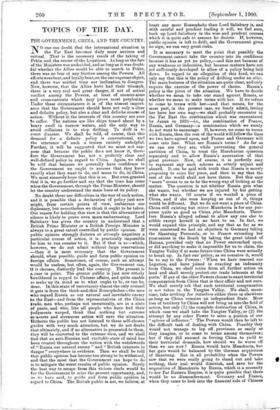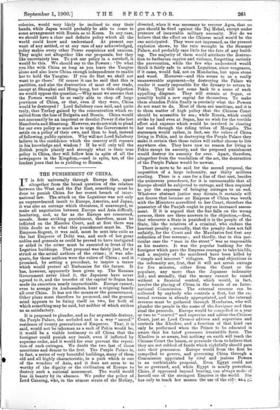TOPICS OF THE DAY.
THE GOVERNMENr, CHINA, AND THE COUNTRY.
NO one can doubt that the international situation in the Far East becomes daily more anxious and critical. That is the necessary result of the taking of Pekin and the rescue of the Legations. As long as the fate of the Ministers was undecided, and as long as it was doubt- ful whether the Allies would be able to march to Pekin, there was no fear of any friction among the Powers. All efforts were bent, and loyally bent, on the one supreme object, and there was neither time nor inclination to disagree. Now, however, that the Allies have had their triumph, there is a very real and great danger, if not of actual conflict among the Powers, at least of counter-aims and cross-currents which may prove most perplexing. Under these circumstances it is of the utmost import- ance that the Government should have not only a clear and definite policy, but also a clear and definite course of action. Without it the interests of this country are sure to suffer. The nations are like ships tossed about by a heavy swell in narrow waters, and the only way to avoid collisions is to stop drifting. To drift is to court disaster. We shall be told, of course, that this demand for a definite policy is conventional, and the utterance of such a truism entirely unhelpful. Further, it will be suggested that we must not sup- pose that because the public does not know it, there- fore the Government has not a perfectly clear and well-defined policy in regard to China. Again, we shall *be told that because we generally have confidence in the Government we ought to assume that they know exactly what they want to do, and mean to do, in China. We most sincerely hope that this is so. But even granted that it is, we go further and say that the time has come when the Government, through the Prime Minister, should let the country understand the main lines of its policy.
No doubt there are difficulties in the way of such action, and it is possible that a declaration of policy just now might, from certain points of view, embarrass our diplomacy, but nevertheless we think it ought to be taken. Our reason for holding this view is that the alternative of silence is likely to prove even more embarrassing. Lord Salisbury has given the country to understand that a British Prime Minister or a British Foreign Minister is always to a great extent controlled by public opinion. If public opinion strongly dictates or strongly negatives a particular course of action, it is practically impossible for him to run counter to it. But if that is so—which, however, we do not admit without large reservations —then it is most necessary that the Government should, when possible, guide and form public opinion on foreign affairs. Sometimes, of course, such an attempt would be useless, but often, again, the Government can, if it chooses, distinctly lead the country. The present is a case in point. The greater public is just now utterly bewildered in regard to Chinese affairs, and quite unable so make up its mind as to what ought to be, or can be, done. In this state of uncertainty almost the only counsel it gets is from the thick-and-thin Russophobes—the men who regard Russia as our natural and inevitable enemy fin the East—and from the representatives of the China trade, men who, perhaps not unnaturally, are in a state ef panic, and who, like all people who have had tbeir judgments warped, think that nothing but extreme siiasures and strenuous action will save the situation. Hitherto the public has not listened to these self-chosen guides with very much attention, but we do not doubt that ultimately, and if no alternative is presented to them, they will be converted to the extreme view, and we shall find that an anti-Russian and excitable state of mind has been created throughout the nation with the watchwords of "Russia our natural enemy" and "British interests in danger" everywhere in evidence. Then we shall be told that public opinion has become too strong to be withstood, and that the most that the Government can hope to do is to mitigate the worst results of public opinion. Surely the best way to escape from this vicious circle would be for the Government to seize the present opportunity, and, as we have said, to guide and form public opinion in regard to China. The British public is not, we believe, at heart any more Russophobe than Lord Salisbury is, and with careful and prudent leading it will, we feel sure, back up Lord Salisbury in the wise and prudent courses which it is quite safe to assume he desires. If, however, public opinion is left to drift, and the Government gives no sign, we run very greet risks.
It is necessary to meet the point that possibly the Government cannot take the country into its confidence because it has as yet no policy,—and this not because of any weakness or indecision, but because matters have not yet sufficiently developed to allow of a policy being laid down. In regard to an allegation of this kind, we can only say that this is the policy of drifting under an alias. The main features of the situation are quite clear, and only require the exercise of the power of choice. Russia's policy is the pivot of the situation. We have to decide whether we mean to take our stand against Russia, or whether we mean to make terms with her. If we refuse to come to terms with her—and that means, for the most part, in the present case, we freely admit, letting her have her own way—we shall probably encounter in the Far East the combination which was encountered by Japan in 1895—i.e., the combination of France, Russia, and Germany—a combination which we surely do not want to encourage. If, however, we come to terms with Russia, then the rest of the world will follow the lines we two have agreed upon, and France and Germany will come into line. What are Russia's terms ? As far as we can see they are, while preventing the general partition of China, to treat the Manchurian question separately and to allow Russia's annexation of that great province. Now, of course, it is perfectly easy to represent any such scheme as utterly unjust and absurd. It can be said with truth that Russia is merely proposing to seize her piece' and then to say that the rest of the world shall not have theirs. But this easy " score " seems to us to be the wrong way of looking at the matter. The question is not whether Russia gets what she wants, but whether we are injured by her getting what she wants. Of course if we wanted a piece of China, and if she were keeping us out of it, things would be different. But we do not want a piece of China. China still existing but minus Manchuria is for our pur- poses quite as good as China plus Manchuria. There- fore Russia's alleged refusal to allow any one else to nibble except herself is no hurt to us. In fact, we would expand this principle, and say that as far as we were concerned we had no objection to Germany taking the Shantung Peninsula, or to France extending her possessions in the South by taking the great island of Hainan, provided only that no Power encroached upon, or did anything to make it impossible for us to claim, the Yangtse Valley if at some future time China were actually to break up. In fact our' policy, as we conceive it, would be to say to the Powers : When we have rescued our Legation, and have joined in exacting an indemnity from China, we shall retire from all further action on land and shall merely protect our trade interests at the ports.' If any of the other Powers choose to exact territorial compensation from China that is their affair and not ours. We shall merely ask that such territorial compensation is not taken in the Yangtse Valley. We shall, mean- time, take nothing for ourselves either there or elsewhere as long as China remains an independent State. Mere loss of territory by China will not bring us into the field of action, but only (1) the complete destruction of China, in which case we shall take the Yangtse Valley, or (2) .the attempt by any other Power to seize a portion of our "sphere of influence." The Powers would then be left to the difficult task of dealing with China. Possibly they would not manage to lop off, provinces so easily as they imagine, or to come to terms among themselves; but if they did succeed in forcing China to yield to their territorial demands, how should we be worse off than we are now ? Russia would have Manchuria, but her gain would be balanced by the German acquisition of Shantung. But in all probability when the Powers saw that we were really going to stand out and take nothing, their zeal would diminish, and save for the acquisition of Manchuria by Russia, which is a necessity to her Far Eastern Empire, it is quite possible that there would be no dismemberment. Germany and France, when they came to look into the financial side of Chinese colonies, would very likely be inclined to stay their hands, while Japan would probably be able to come to some arrangement with Russia as to Korea. In any case, we should have a clear and definite policy which all the world could know and understand. At present our want of any settled, or at any rate of any acknowledged, policy makes every other Power suspicious and anxious. They might not altogether like our proposals, but they like uncertainty less. To put our policy in a nutshell, it would be this. We should say to the Powers : 'Do what you like with China as long as you leave the Yangtse alone and also leave China enough independence to enable her to hold the Yangtse. If you do that we shall not want to go there.' Of course it can be said that this is partition, and also the destruction of most of our trade, except at Shanghai and Hong-kong, but to this objection we would oppose the question,—Why must we assume that the Powers would be so easily able to chop off large provinces of China, or that, even if they were China would be destroyed? Lord Salisbury once said, and quite truly, that Turkey gained by the concentration which re- sulted from the loss of Bulgaria and Bosnia. China would not necessarily be an impotent or derelict Power if she lost Manchuria and Shantung. However, we do not wish to plead for our own policy so much as to urge the Government to settle on policy of their own, and then to lead, instead of following, public opinion. Why will not Lord Salisbury believe in the confidence which the country still reposes in his knowledge and wisdom ? If he will only tell the British people plainly and strongly what is their true policy in China, they will follow him in spite of all the newspapers in the Kingdom,—and in spite, too, of the loudest jeers that he is yielding to Russia.



































 Previous page
Previous page